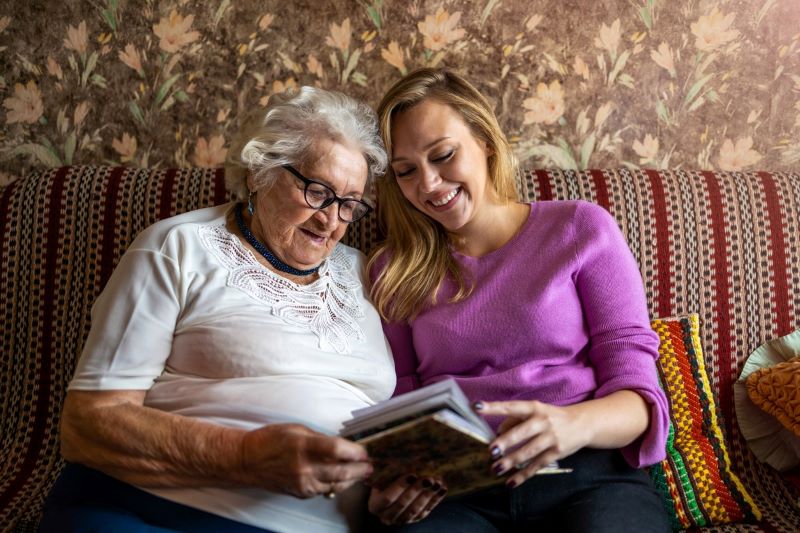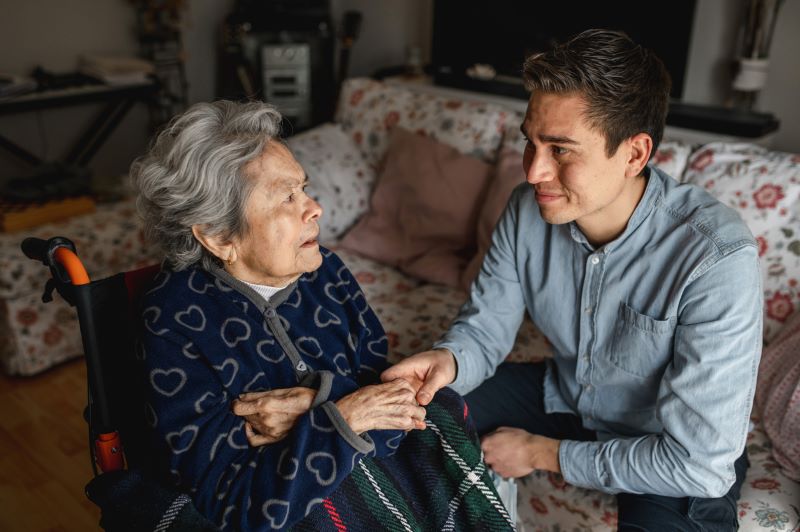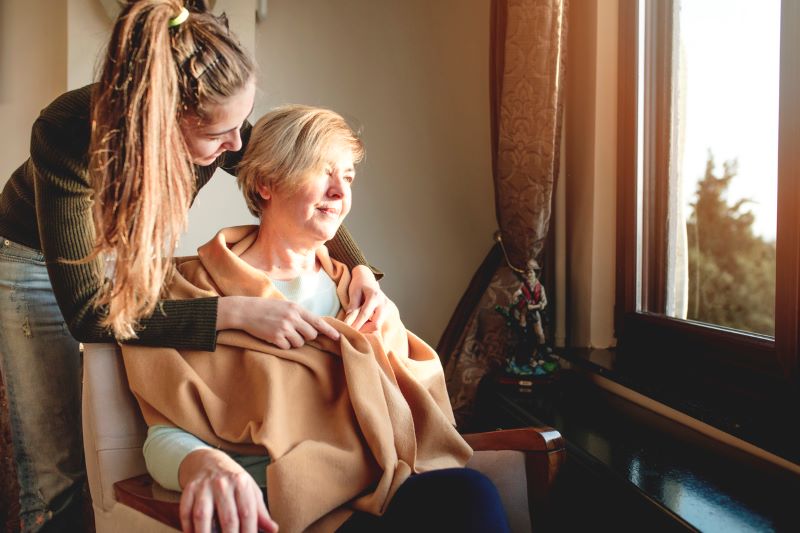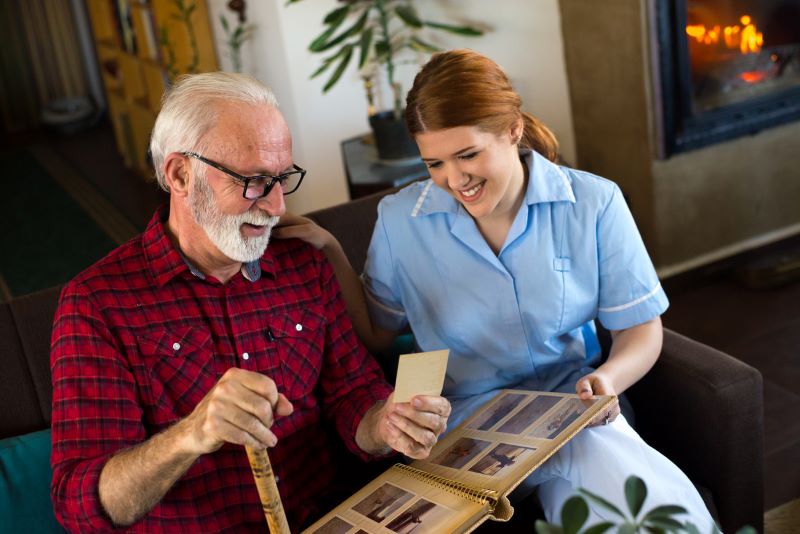You’ll often hear the words Alzheimer’s and Dementia used together or interchangeably. While most people understand that these diseases deal with memory loss, the difference between the two is sometimes confusing.
Dementia is a generic term that encompasses many forms of memory problems. These issues affect memory and the ability to communicate and carry out simple functions of daily life. However, Alzheimer’s is one of many diseases that can lead to dementia.
Do you or a family member need help with progressive memory loss? Contact one of our caring professionals to see how we can help.
What Is Alzheimer’s Disease?
Alzheimer’s is a degenerative brain disease that causes increased memory issues as the disease progresses. People with Alzheimer’s may exhibit symptoms such as forgetfulness that eventually worsen as a person moves through the stages.
While forgetfulness as people age is a common side effect of growing older, it doesn’t progress to the extremes exhibited by Alzheimer’s Disease.

Who Can Get Alzheimer’s Disease?
While anyone can get Alzheimer’s, it is seen most frequently in people age 65 and older. However, around 200,000 people under age 65 in the U.S. have early-onset Altzheimers.
Alzheimer’s Disease accounts for 60%-80% of all dementia1 cases. It’s important to understand that Alzheimer’s is not a normal part of aging.
What Causes Alzheimer’s Disease?
Altzheimers Disease is believed to be caused by the build-up of proteins in and around the brain cells. It appears this process happens over a long period of time.
There is no one known cause, but there are several factors that may increase the chances of an Alzheimer’s diagnosis, including:
- Age. The likelihood of Alzheimer’s doubles every five years2 after age 65.
- Genetics. People with a parent or sibling with the disease are twice as likely to get the disease themselves.
- Environment and Lifestyle. Exposure to toxins, poor sleep, lack of exercise, type 2 diabetes, smoking, drinking, high blood pressure, or cholesterol may contribute to the disease.
- Head Injury. Traumatic brain injuries may increase the chances of developing Alzheimer’s.
- Social environment. Involvement in socially and mentally engaging environments throughout a lifetime appears to lessen the risk of Alzheimer’s.
Common Alzheimer’s Symptoms
People who develop Alzheimer’s experience symptoms in three defined stages. Within the progression of Alzheimer’s Disease, specific symptoms become more pronounced.
1. Early Stage
In this stage of the disease, a person can still function independently and carry out the necessary activities for daily living. While they may forget familiar words or where they placed something, symptoms at this stage are not overtly apparent. Some symptoms of this stage include:
- Difficulty remembering correct words or names
- Forgetting names of people recently met
- Forgetting material that was recently read
- Difficulty remembering where something was placed
- Struggles with planning, organizing, or performing tasks

2. Middle Stage
This stage of Alzheimer’s can last for many years and displays a gradual worsening of symptoms. Symptoms in this stage include:
- Forgetting personal history or events, phone number, or location
- Increased tendency to wander
- Difficulty getting dressed or dressing inappropriately for the season
- Change in sleep patterns (restlessness at night)
- Increased suspiciousness, delusions, compulsive or repetitive behavior
- Difficulty controlling bladder
- Moody or withdrawn
3. Late-Stage
Symptoms in this stage are severe. Cognitive and memory skills increasingly deteriorate, and extensive care usually becomes necessary. Symptoms in this stage include:
- Changes in physical abilities (sitting, walking, swallowing)
- Difficulting communicating
- Inability to manage personal care
- Unaware of their surroundings or recent experiences
- Compromised immune system3
Do you or someone you know need help dealing with the memory loss of a loved one? Contact our team and find out how we can help.
What is Dementia?
Dementia is a syndrome that encompasses one or more causes that contribute to the deterioration of cognitive functions in the brain. People develop dementia when brain cells are damaged by disease or other factors.
Over 55 million people4 have dementia worldwide, with almost 10 million new cases diagnosed every year.

What Causes Dementia?
Dementia is caused by damaged nerve cells and their connections to the brain. People with dementia have symptoms that vary with different types of dementia depending on where damage in the brain has occurred.
Many factors may cause a person to develop a form of dementia, including:
- Other Forms of Dementia (Lewy Body Dementia, Frontotemporal Dementia, Vascular Dementia, Mixed Dementia)
- Disease (Alzheimer’s Disease, Huntington’s Disease, Creutzfeldt-Jakob Disease, Parkinson’s Disease)
- Traumatic Brain Injuries
- Age
- Family History
- Down Syndrome
- Lifestyle (smoking, drinking, sleep, overall health)
- Medications or Vitamin Definicies
- Air Pollution
Dementia Symptoms
Dementia symptoms can vary with different types of dementia or the various stage of progression. There may be evidence of social and cognitive changes that can help diagnose the onset of dementia.
Changes in Social Behavior
- Anxiety
- Depression
- Hallucination or delusions
- Paranoia
- Agitation
- Personality Changes
- Disinterest in daily activities or events
- Impulsiveness
- Insensitive to other people’s feelings
- Poor judgment and confusion
Changes in Physical and Cognitive Abilities
- Memory loss
- Difficulty speaking, reading, writing, or expressing needs
- Repeated question
- Wandering and getting lost
- Issues with balance and movement
- Trouble handling money and paying bills
- Using unusual words for familiar objects
- Taking longer than usual to complete activities
We can help you decide on the best treatments for a loved one. Contact our Alzheimer’s memory care team to learn more.
Treatments for Alzheimer’s Disease and Dementia
While there is no cure for Alzheimer’s Disease or dementia, certain treatments could alter the course of progression. Depending on your preferences and the type of memory loss you are dealing with, your doctor may discuss both drug and non-drug options with you.
Medications
- Cholinesterase inhibitors. Donepezil (Aricept), rivastigmine (Exelon), and galantamine (Razadyne) can help deal with symptoms by boosting levels of certain chemicals in the body involved with memory and judgment.
- Memantine. Regulates chemical messengers in the brain.
- Other medications. Treatments for insomnia, depression, parkinsonism, agitation, hallucinations, or other symptoms may be helpful.
Therapy
- Occupational therapy. Provides assistance with behavior modification and safety in the home.
- Modification. Modify the environment by reducing noise and clutter, hiding dangerous objects, and putting systems in place to prevent wandering.
- Simplify. Break tasks down into small steps. Keep structures and routines in place.

Memory Care for People With Advanced Alzheimer’s Disease
As the disease progresses, continued care at home may not be possible. Providing memory care assistance for late-stage Alzheimer’s can be a tough decision, but there are many good options for support. Remember, help is out there when you need it.
As memory loss advances, a closer watch on day-to-day tasks becomes necessary as even the simplest tasks can become major obstacles. Here are some areas to keep an eye on:
1. Nutrition
At this stage, a person may forget to eat, so it’s crucial to monitor the intake of fluids and food and keep an eye on weight.
2. Bathroom
Loss of control over the bladder and bowels can become more common, and they may need to be led to the toilet and guided through the process.
3. Circulation
With movement becoming more difficult, sitting or sleeping for extended periods of time may create pressure sores or freezing of joints. Encouraging movement (no matter how small), keeping the skin clean and dry, and changing positions every two hours can help alleviate unwanted problems.
4. Illness
Vulnerability to infections or pneumonia may increase as activity levels decrease. Practicing good oral hygiene, prompt medical care for injuries, and regular flu vaccines may help keep them fight off germs more effectively.
5. Pain
As Alzheimer’s Disease advances, communication can be severely affected, and pain may be difficult to communicate. Look for physical signs, non-verbal signs, or changes in behavior to identify when steps need to be taken and medication provided.
Memory Care and Support for Your Loved One
Understanding the difference between dementia and Alzheimer’s can help prepare for the progression and awareness of what to be looking for in each stage.
If you need help providing care for a loved one with memory loss, Haven Heath has experienced professionals and a caring medical staff that can walk you through the process. Contact us today to see what kinds of support we can provide.

Sources:
1Alzheimer’s Association. What is Alzheimer’s Disease? Retrieved 10 February 2022.
2American Brain Foundation. Alzheimer’s Disease. Retrieved 10 February 2022.
3Hitti, M. (10 June 2005). Immune System Problem Linked to Alzheimer’s. WebMD. Retrieved 10 February 2022.
4World Health Organization (WHO). (2 September 2021). Dementia. Retrieved 10 February 2022.